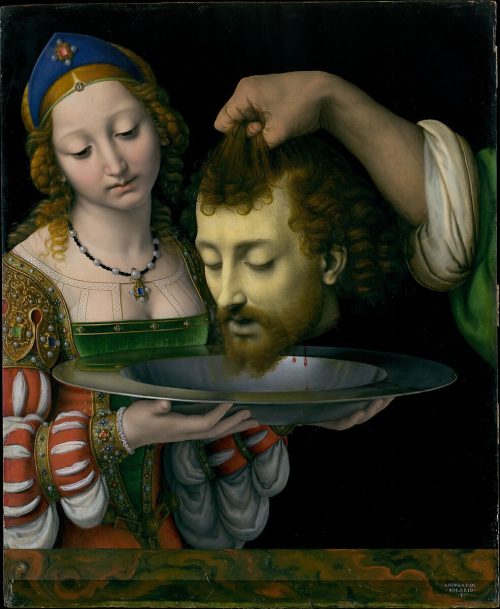Tuesday, August 29, 2023
Memorial of the Passion of Saint John the Baptist
(click here to listen to or read today’s scriptures)
On the death of John the Baptist
Thomas Keating, popularizer of the Christian meditation practice called “centering prayer”, considered how difficult it is to talk about God.
“Who is God?” warns us that when we use this term, it always has a ‘super’ meaning. So, when you say God, you don’t really mean God. You mean your idea of God.
Keating refers in this way to “apophatic” prayer and theology. He continues:
To put it another way, you mean God as not-God. I say that because whatever we say about God is more unlike who God is than saying nothing. … Well, all that words do, all that dogmas do, all that doctrines and rituals can do for us is to point in the direction of the mystery, of the super-meaning of God. … It’s a mystery and a reality at one and the same time, and so this warns us that we have to be prepared to expand our idea of God in ways that are more and more inclusive but less and less articulate.
Keating encourages me to move into less linear ways to experience God, along with bible study and memorization, and directed prayer. This blends together, I think: a single-minded pursuit of God through the Bible, and a meta-minded (is that even a thing?) waiting on God in meditation and imagination. I chase awhile, and then I sit down and go still, and sit some more.
This rhythm provides a spiritual pacemaker for my raucous, wild heart and mind, and I suspect it works this way for many of us. Like maybe it was also true in the old days, for John the Baptist alone for long days in the desert, then presenting God to crowds who came out to find him. Maybe for Paul, who also spent days traveling alone and then spoke before crowds of believers and skeptics. For Jesus, even, this rhythm of study and prayer filled his days.
Thinking of Jesus, I realize an important missing piece. Preaching and teaching and writing is a part of it, but not all. Words are not enough. Jesus touched people (not in violence but in peace). His hands brought healing, the “salv-ation” of his presence carried people out of their afflictions into the physical love of God.
Paul learned from Jesus:
We were gentle among you, as a nursing mother cares for her children. With such affection for you, we were determined to share with you not only the Gospel of God, but our very selves as well, so dearly beloved that you had become to us.
On Monday nights at 7 Central Time a small group of us gather via Zoom for about an hour of lectio divina, centering prayer and conversation about a spiritual reading. Anyone can join the group at any time for any length of time. I am an inconsistent attender, and my practice of centering prayer meditation is inconsistent as well. But even still, as the years pass I become more comfortable in my skin being one of God’s kids, not because of what I’ve done, but because of who I am (as the song goes). This kind of prayer helps me so much.
You search me, and you know me, Lord. You know when I sit and when I stand; you know my thoughts. You are familiar with all my ways. Before a word is on my tongue, you know the whole of it. You hem me in behind and before, and you lay your hand upon me. Such knowledge is too wonderful for me, too lofty for me to attain.
Remembering the death of John the Baptist, I think of those weeks or months alone in his dungeon cell below the ground. No fresh air as there had been desert mornings, no flowers blooming in a sudden shower, no visitors. Did he find his way into the presence of God anyway? In his solitary confinement, did God hold him warm and safe between his wings? Then at last, as he heard the unexpected clang of opening doors long after midnight, did he know what was coming, did he know God’s touch?
An executioner brought in John’s head on a platter and gave it to the girl.

Andrea Solario, 1507-1509 at the Metropolitan Museum of Art, New York City
If I pretend to have answers to the questions, I miss an important point. Rilke the poet wrote about “living the questions” when the answers could not yet come. God gives us space to “not know.” Be still and “not know” must precede the knowing. There is no hurry. God isn’t going anywhere. And so therefore, neither are we.
(1 Thessalonians 2, Psalm 139, Matthew 5, Mark 6)
(posted at www.davesandel.net)
#